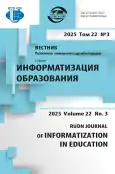Defining the concepts of literacy and competences in artificial intelligence in the context of teacher education
- Autores: Smyshliaeva O.V.1, Gruzdeva M.L.1
-
Afiliações:
- Minin Nizhny Novgorod State Pedagogical University
- Edição: Volume 22, Nº 3 (2025)
- Páginas: 371-381
- Seção: ICT SKILLS AND COMPETENCIES AMONG TEACHERS
- URL: https://bakhtiniada.ru/2312-8631/article/view/321330
- DOI: https://doi.org/10.22363/2312-8631-2025-22-3-371-381
- EDN: https://elibrary.ru/TDAXST
- ID: 321330
Citar
Texto integral
Resumo
Problem statement. Improving the level of knowledge and skills in the field of artificial intelligence is becoming one of the significant tasks identified at the state level today. The development of such skills is also necessary for students of pedagogical specialties. Examined various approaches to defining competencies and literacy in the field of artificial intelligence at different stages of education. The basis for their study were Russian and foreign publications on this issue. Methodology . An analysis and systematization of articles devoted to competencies, literacy and professional training of future teachers in this area was carried out, and the relationships between these concepts and the concepts of digital competencies and digital literacy were established. Results . It is revealed that the formation of AI-competences in pedagogical education in Russia is considered in the framework of formation of digital competences or ICT-competences. The notion of AI-literacy, AI-competences and AI-competence is formulated, and the interrelations of these notions are defined. Conclusion . Definitions of AI literacy components, content and formation of AI competencies for future teachers are given.
Palavras-chave
Sobre autores
Olga Smyshliaeva
Minin Nizhny Novgorod State Pedagogical University
Autor responsável pela correspondência
Email: smyshlolga@yandex.ru
ORCID ID: 0000-0002-0543-1825
Código SPIN: 1331-8538
Senior Lecturer, Department of Informatics and Information Technologies in Education
1 Ulyanova St, Nizhny Novgorod, 603005, Russian FederationMarina Gruzdeva
Minin Nizhny Novgorod State Pedagogical University
Email: gru1234@yandex.ru
ORCID ID: 0000-0002-3013-3627
Código SPIN: 7926-9458
Doctor of Pedagogical Sciences, Professor, Department of Service Technologies and Technological Education
1 Ulyanova St, Nizhny Novgorod, 603005, Russian FederationBibliografia
- Toktarova VI, Rebko OV. Digital competences of educators in the domain of artificial intelligence: model analysis and requirements. Information and education: frontiers of communication. 2023;(15):155–158. (In Russ.) EDN: CRADGT
- Evstigneev MN, Sysoev PV, Evstigneeva IA. The competence of a foreign language teacher inthe field of artificial intelligence. Foreign Languages at School. 2024;(3):90–96. (InRuss.) EDN: AUPRSP
- Pakhtusova NA, Uvarina NV. Updating the problem of future teachers’ readiness to use artificial intelligence technologies in the context of digitalization of education. World of Education – Education around the world. 2023;(4):216–223. (In Russ.) EDN: IPFSIG
- Long D, Magerko B. What is AI literacy? Competencies and design considerations. In:Bernhaupt R, Mueller F, Verweij D, et.al. (eds.) CHI’20: Proceedings of the 2020 CHI Conference on Human Factors in Computing Systems, 25–30 April 2020, Honolulu, USA. New York: Association for Computing Machinery; 2020. p. 1–16. https://doi.org/10.1145/3313831.3376727
- AI competency framework for teachers. UNESCO, 2024. https://doi.org/10.54675/ZJTE2084
- K-12. AI curricula. A mapping of government-endorsed AI curricula. UNESCO, 2022. https://doi.org/10.54675/ELYF6010
- Uvarova NN, Vysotskaya TP, Saidov ZA. Analysis of domestic experience in the formation of competencies in the field of artificial intelligence among trainees. Problems of Modern Pedagogical Education. 2023;(79-1):332–336. (In Russ.) EDN: HKIYOE
- Sokolov NV. Assessment of statistical data between academic orientation and increasing the formation of competencies among bachelor students in the field of artificial intelligence. Pedagogical Education and Science. 2023;(2):53–58. (In Russ.) EDN: DASIFM
- Drobakhina AN, Slikishina IV. Preparing future teachers for the use of artificial intelligence systems in professional activities. Sibirskiy Uchitel. 2024;(1):24–28. (In Russ.) EDN: XZLNQJ
- Nurieva DR. The role of artificial intelligence technology in the structure of a teacher’s information competence. Naukosfera. 2024;(6):201–205. (In Russ.) http://doi.org/10.5281/zenodo.12166023 EDN: FCWVWI
- Boronenko TA, Fedotova VS. Forming ideas about artificial intelligence technology as acomponent of the digital competence of a computer science teacher. In: Kolomina MV, Ivashinenko EA. (eds.) Prospects and possibilities of using digital technologies in science, education and management: Proceedings of the All-Russian Scientific and Practical Conference, 21–23 April 2022, Astrakhan. Astrakhan: Tatishchev Astrakhan State University Publ.; 2022. p. 32–35. (In Russ.) EDN: WBJGFI
- Ayanwale MA, Adelana OP, Molefi RR, Adeeko Ol, Ishola AM. Examining artificial intelligence literacy among pre-service teachers for future classrooms. Computers and Education Open. 2024;6:100179. https://doi.org/10.1016/j.caeo.2024.100179
- Chiu ThKF, Ahmad Z, Ismailov M, Sanusi IT. What are artificial intelligence literacy and competency? A comprehensive framework to support them. Computers and Education Open. 2024;6:100171. https://doi.org/10.1016/j.caeo.2024.100171
- Sperling K, Stenberg C-J, McGrath C, Åkerfeldt A, Heintz F, Stenliden L. In search of artificial intelligence (AI) literacy in teacher education: a scoping review. Computers and Education Open. 2024;6:100169. https://doi.org/10.1016/j.caeo.2024.100169
- Sharikov AV. Digital literacy concepts: russian experience. Communications. Media. Design. 2018;3(3):96–112. (In Russ.) EDN: WCWGBC
Arquivos suplementares









